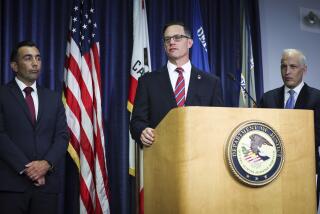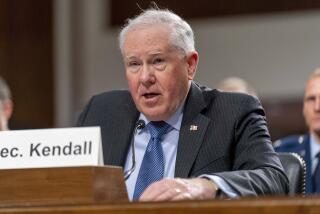Inquiry Focuses on Ban on Contacts With Firm : Navy Official’s Boeing Briefing Probed
- Share via
WASHINGTON — Federal agents are investigating the circumstances under which James E. Gaines, a top Navy official linked to the Pentagon fraud investigation, received a lengthy briefing on a sensitive anti-submarine warfare system being developed by the Boeing Co. at a time when he was officially barred from dealing with the aerospace giant, the Navy said Tuesday.
Gaines was briefed by officials of Boeing Aerospace over a three- or four-day period last October on a new electronics system Boeing is designing for the Navy’s P-3C submarine reconnaissance aircraft, according to Navy expense records and Boeing spokesman Harold Carr.
The Navy official had been barred “from taking any action in connection with matters involving” Boeing since September, 1986, according to records obtained by The Times, because he has maintained a financial interest in the defense contractor through a pension fund. Gaines worked at Boeing for 29 years.
Guidelines and Law
In addition to the requirements of Navy ethics guidelines, federal law bars government officials from participating “through decision, approval, disapproval, recommendation, the rendering of advice, investigation, or otherwise . . . “ in matters in which they or their families have financial interests.
Lt. Brian Cullin, a Navy spokesman, said the issue of Gaines’ briefing, first reported by The Times, has been referred to the Naval Investigative Service. The agency is responsible for looking into possible violations of criminal law by Navy personnel.
The Times has reported that the FBI believes that Gaines may have passed information about subcontractors’ bids on the anti-submarine project to Gaines’ former boss, defense industry consultant Melvyn R. Paisley. Attorneys for Gaines and Paisley have denied the accusation.
Both from Boeing
Paisley, who served as assistant Navy secretary until March, 1987, represented the parent of one of the companies competing for a Boeing subcontract. Gaines joined Paisley, another former longtime Boeing employee, at the Navy Department in 1985.
Still in its earliest stages, the anti-submarine system--known as the “P-3C Update IV” project--is expected to generate billions of dollars in construction awards to Boeing and its subcontractors, defense industry sources have said. Boeing was awarded a $244-million engineering and design contract for the system last August.
Gaines’ attorney, Michael Schatzow, said in an interview two weeks ago that Gaines had received permission from unspecified superiors to travel to Seattle for the Boeing briefing. “I think that you would find that he (Gaines) had all the permission he needed and that there was nothing inappropriate or nefarious about his being” at Boeing, Schatzow said at the time.
Declines to Comment
When told Tuesday that the Navy is investigating the trip, Schatzow said: “I just don’t want to comment any more than I’ve already commented.” He declined to say who gave Gaines permission to attend the Boeing briefing or whether the permission was written or oral.
A Defense Department attorney who handles ethics matters said Tuesday that it is “very unusual” for a military official to participate in any way in a project involving a company after signing what is known as a formal disqualification order. On the rare occasions when such a disqualification order is waived, the law requires that the waiver be in writing, said the attorney, who spoke on the condition that he would not be named.
Gaines, deputy assistant secretary of the Navy for acquisition management, international programs and congressional support, was ordered to avoid dealing with Boeing in a letter dated Sept. 19, 1986.
Letter from Superior
The letter, signed by Richard L. Rumpf, Gaines’ immediate superior, told Gaines that he was disqualified “from taking any action in connection with matters involving (Boeing) or any subsidiary or affiliate. . . . Such actions include, but are not limited to, participation in program reviews, approval of funding actions, review of acquisition plans and justifications and approvals.”
The letter was prompted by a financial disclosure report filed the previous March, in which Gaines stated that he was receiving $10,000 a year from Boeing at the time as part of his pension plan.
More to Read
Inside the business of entertainment
The Wide Shot brings you news, analysis and insights on everything from streaming wars to production — and what it all means for the future.
You may occasionally receive promotional content from the Los Angeles Times.










